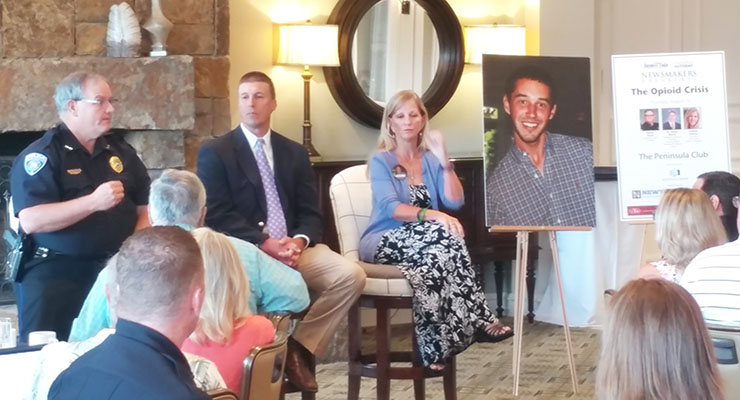
Cornelius Chief of Police Bence Hoyle, Dr. Jason Mutch and Debbie Dalton talk about the Opioid Crisis.
By Dave Vieser. As people poured into The Peninsula Club for Cornelius Today’s Newsmakers Breakfast on the Opioid Epidemic, it was clear that concern ran high.
A recently published paper by Princeton University’s Alan Krueger, an economics professor, suggests that the widespread use of opioid painkillers may be linked to declining workforce participation among American men between the ages of 24 and 54. Meanwhile, there are growing concerns about another lost generation—the young children whose parents have been lost to opioid-addicted parents.
What the people at the Newsmakers Breakfast heard for the next hour was the naked truth from a parent who lost a child, the Chief of Police and an emergency room doctor.
The news was alarming.
“We are seeing an unprecedented number of overdoses,” said Police Chief Bence Hoyle. “The key is to regulate and educate.”
Dr. Jason Mutch, medical director of Novant-Huntersville Emergency Department, said this is not an inner-city issue anymore. “These drugs are being used throughout the community and it’s really impacting our emergency medical services.”
And Debbie Dalton, a Cornelius resident who lost her son Hunter two years ago to an accidental overdose, said that “students are still not hearing about these dangerous drugs in the schools. We need to broaden our education programs and we need to do it now.”
All three on the panel agreed that there’s no silver bullet. Drugs such as Fentanyl are incredibly strong, yet cheap to manufacture. It is used legally in medical anesthesia but most of the opioids found on the street are made illegally, out of the country, and then used to lace with other recreational drugs—sometimes at lethal doses. Moreover, there’s absolutely no “quality control.” So recreational users, especially first-timers, have no idea they might be taking a fatal dose.
The opioid epidemic—the deadliest drug crisis in US history—could kill more people over the next decade than the entire population of Baltimore. The American Journal of Public Health says access to the opioid overdose antidote naloxone, could help stem the tide of potentially 510,000 deaths over the next 10 years. North Carolina had the second-highest increase nationally in overdose deaths in 2017. There were more than 5,000 visits to emergency rooms due to overdoses. Roughly 50 percent of the overdose survivors were uninsured.
Experts agree that fixing the opioid epidemic will take a combination of solutions. Which approaches will prove to be most effective? To make it all the more difficult, painkillers are a part of life for a wide variety of pain patients, young and old alike—none of whom began as drug abusers.
One area where action is being taken now is the establishment of state prescription drug monitoring programs to reduce the supply of prescription opioids that end up being used recreationally while maintaining adequate access for current chronic pain patients. Sen. Jeff Tarte, the former Cornelius mayor who attended the breakfast, said Senate Bill 616, known as the Heroin and Opioid Prevention and Enforcement Act, seeks to strike the correct balance between overuse of these drugs and the legitimate needs of chronic pain patients. Portions of the bill went into effect July 1, while the remainder will be effective on July 1, 2019.
Chief Hoyle commends the state law as a good start but believes the establishment of a federal monitoring program would be even more effective. “As it stands now, when you cross the state line, there’s a whole new data base to access.”
And while such measures will help track both prescription and use of the opioids, Dalton says the schools must step up their education efforts now. “I’ve been to schools where many of the students know nothing about these drugs. This is a vital issue, and not just for high school level students either. We need programs to educate middle school students, maybe even some elementary school grades too.”
After losing her son two years ago, Dalton was not content to wait for the school systems to “catch up.” She and her husband Randy started the HD Life Foundation committed to providing education and resources to prevent the use of potentially lethal recreational drugs. “We’re doing everything we can as parents to get the word out about the dangers of these drugs.”
One area where all three guest speakers agreed is that the country is not yet equipped to deal with the magnitude of the problem, and that corporate sponsorship for public service announcements and other education measures is desperately needed.
Cornelius resident Lisa Woy also suggested to the panel that parents be included in educational programs about recreational drugs. Chief Hoyle agreed, but admitted that “sadly we do run into a significant number of parents who are just not interested or don’t really want to hear about the opioid crisis.”




